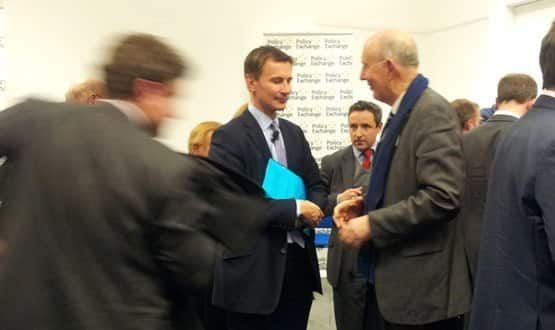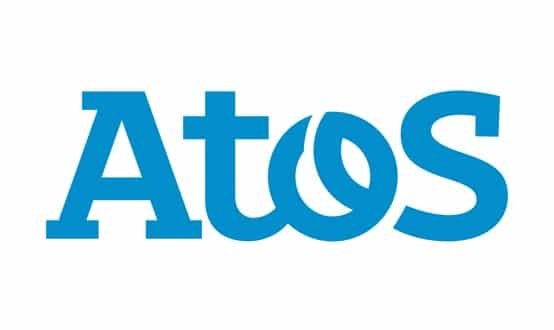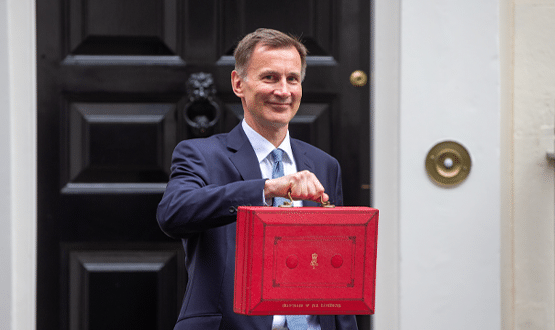Hunt’s plan for austerITy
- 17 January 2013

The right-wing think-tank Policy Exchange holds events in what it calls an ‘ideas space’. The name conjures up the plush, free-wheeling, bare-foot wonk-ing that was so mercilessly pilloried by the last series of ‘The Thick of It.’
So it’s rather disappointing that the venue is, in fact, a threadbare room painted in tired white gloss and equipped with hard blue chairs on hard blue carpet.
Health secretary Jeremy Hunt was at the ideas space on Wednesday evening to outline plans for a paperless NHS that had been trailed earlier in the day.
It felt like an appropriate setting. Hunt has a grand vision – electronic records and electronic communications across health and social care by 2018 – but he has little beyond encouragement to offer those organisations that want to realise it.
There is certainly no money. Hunt wasn’t asked whether there was funding available for his plans during an extensive Q&A, so eHealth Insider asked one of his aides whether any would be found.
“No. Oh God. Do you mean central money? No, not a thing,” was the response. Well, there might be some cash – such as the £140m that the prime minister found for better IT for nurses back in October – but substantially “this is going to be local investment to save.”
Mr and Mr Smith
There are many reasons to invest in electronic records and communications, and Hunt touched on the convenience, choice, and safety arguments in his speech.
But his big pitch to NHS managers was that investing in technology could help their organisations to deliver the efficiency savings that are being demanded of them as the health service tries to balance flat funding with rising demand.
To underline the point, he opened his speech by telling a story about “two Mr Smiths” who sat next to each other on a flight from LA to New York in 1953.
One ran American Airlines, one ran IBM, and the result of their meeting was the booking system that revolutionised the industry and made mass flying possible because travel agents – and eventually passengers – could cheaply book tickets themselves.
“Think what would have happened if one of those Mr Smith’s had worked for the NHS,” Hunt joked. “The revolution that has touched so much of our lives has barely started to touch the health service.”
Hunt went on to outline some well-known examples of where IT is being used to good effect. For example, he said King’s College Hospital in London is “on track” to become paperless by the end of the year, having rolled out e-prescribing.
And he name-checked South London and Maudsley NHS Foundation Trust’s ‘myhealthlocker’ project to create patient held records on Microsoft Health Vault.
Overall, though, he argued that the NHS needed to go faster, which was why he had decided to set out “a new ambition for the NHS.” “I want it to be paperless by 2018,” he said, “the most digital health service in the world.”
Familiar vision, new deadlines
Along the way, the NHS should hit other milestones. The NHS Commissioning Board has just agreed that hospitals “should be ready to operate electronic records by 2014” and to accept e-referrals by 2015.
The board is “working on guidance to help local hospitals to do this.” As previously announced, patients should have online access to their GP records by 2015, with others to follow.
To pull things together, “by 2013-14, the NHS Number will become the primary identifier for NHS patients, so records can be related to that person.”
Making the NHS Number the primary identifier for NHS patients has been a government ambition for so long that targets for achieving it predate the National Programme for IT in the NHS.
In other respects, Hunt was very clear that while his vision is very similar to that outlined before the programme was launched a decade ago, he will not be trying to emulate its methods.
There will be no national contracts, no national database of patient records. “It may be said that we have been here before,” he said, “and that Labour tried this and failed.
“Labour had the right idea, but their programme became the equivalent of ordering an aircraft carrier; it became over-centralised and impossible to manage. It is local initiative that works.”
No cash
If Hunt’s vision is to be realised, then local initiative will have to work, because of that lack of central funding. The days of central contracts for ‘strategic’ IT systems and implementation worth £12.7 billion are long-gone.
Instead, trusts will be encouraged to invest in technology in order to make savings elsewhere. In his speech, Hunt repeatedly referred to a report from PriceWaterHouseCoopers that the DH released on Wednesday morning.
The consultant’s report, conducted in just a few weeks and based entirely on desk research and interviews with PwC staff, contends that around £1.7 billion of recurring savings can be found from four ‘priority activities’.
One of these, implementing e-prescribing and the Electronic Transfer of Prescriptions Service, is business left over from the national programme.
And another, making patient information available to clinicians at the point of care, is effectively the business of the programme; even if the PwC report talks about doing this by using “portals” or “other solutions.”
Even if these can be completed without the cash that the programme had available to it, realising savings may not be that easy.
A recent report on America’s massive, seven year investment in electronic patient records concluded that few of the $81 billion of annual savings that the RAND Corporation predicted have been realised to date.
The Health Affairs report concluded that this is because US institutions have chosen systems that are not interoperable and failed to re-engineer their processes to make the best use of the technology they are adopting.
Given that the US programme was far more directed and linked to payments for ‘meaningful use’ than anything that is now being proposed for England, it is far from clear how these problems may be overcome.
PwC’s other big idea for the NHS to make recurring savings is for it to fall into line with the government’s wider ‘digital first’ strategy. And even PwC admits that a review of digital first has “stressed the difficulty of accessing these benefits.”
Challenges
So, as Hunt acknowledged in the ideas space, the latest target to digitise the NHS represents “huge ambition” but also presents “huge challenges” – without even considering other issues that his speech touched on, such as security, confidentiality, and simple staff reluctance to spend time using screens.
Questions from Hunt’s audience suggested that it was sceptical that these challenges can be overcome; but then, Policy Exchange’s constituency is people who believe that business will always do things better than public service and the best way to get change is to turn users into consumers.
Hunt was having none of this. Perhaps surprisingly, given his popular image as a right-winger even within the present government, he made a number of references to the social value of the NHS, and to the effective, efficient and equitable way that it deals with most patients, at least elective ones.
The NHS, he suggested, could adopt IT to “help it deliver services sustainably.” It just needs to understand that it must.




